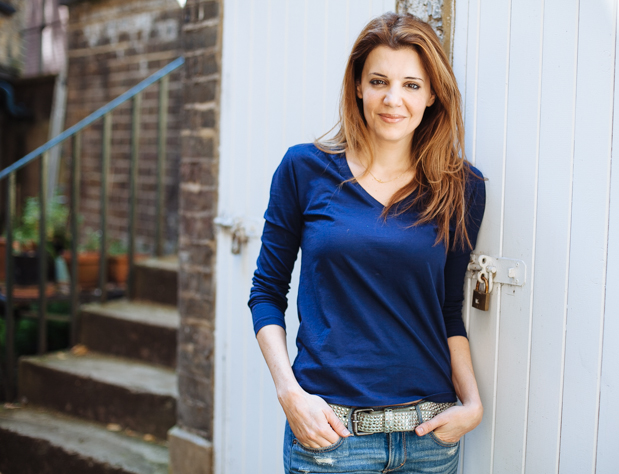
Dr. Linda Papadopoulos, research scientist and practising psychologist, from Canada & Cyprus, lives in London
When I first met Linda, a few years ago, I had no idea who she was; I only knew her as the soft-spoken mom of Jessie, the most awe-inspiring 7-year old I had ever met. I admired how sweet, peaceful and easy-going she always seemed and was happy (but not surprised) to see that her soft demeanour also comes across in the articles she writes for various publications. After reading a specific piece she did for Cosmopolitan a few months ago, where she discussed women’s relationship with food, I could not wait to ask her more about it and also pick her brain regarding issues related to body image.
Linda’s interest in people’s complex relationship with their appearance, and specifically their skin, was first initiated after observing the effects that a serious skin disease had on a close family member, especially in terms of self-esteem and body image. She is currently doing a lot of work with teenagers, mostly girls, and apparently many of the issues that often come up are about diets, weight and calories.
The first thing Linda was quick to underline during our discussion, is how connected food is with our emotions: ‘we crave comfort food, such as ice-cream, when going through a difficult time; at the same time, it is so often that we express our love and affection through food; I don’t know whether my grandfather has ever told my grandma he loves her, but I’ve seen over and over again how much he cares about her through the attention he puts on their meals.’
Current trends dominating the food scene put a lot of focus on eating very clean, often eliminating certain ingredients (gluten free, paleo, raw etc); at the same time, especially through the appeal of social media, being super fit is also on the spotlight. How do you see this in relation to a healthy body image?
There is definitely a fetishisation of diets; people talk about them like they are badges of honour: ‘oh, I just completed a 5-day juice cleanse’; ‘I’ve gone off sugar completely’; ‘Have you tried paleo yet?’ Medical issues and allergies aside, this brings forward a competitiveness, which is not about being healthy, but rather about the way we often see ourselves: not for who we are, but in comparison to others, be it our peers or public figures.
Do you think this stems from this relatively new trend, which concerns both women and men, to be very healthy and hugely concerned with their appearance?
Definitely. I see it in both genders, in regards to different issues: appearance, roles they have to assume, health, etc. “Fat talk’ (from teenage girls and women as well) and ‘old talk’ (from women from mid thirties to late forties) are quite predominant and very revealing as to how much importance is being put on image. The things is, there is no such thing as perfection. How is that even defined? Especially in relation to food which, apart from survival, is also very much about pleasure. Having this negative frame of mind, it’s quite hard not only to enjoy food, but also to be practical about it, both in terms of cooking as well as eating. Food is also about interaction, it’s a social event, people eat with their families at home, or out with friends, so all these different fads end up complicating much more than one’s diet.
How can one maintain a balance between being healthy without becoming a slave to all these food trends and the overwhelming pressure to look perfect?
I always think of the 70-30 rule; being 70% good and 30% bad; making good choices, for the most part, but also letting go, or indulging a little bit. This relates to my previous answer, about perfection. I am not perfect, nor do I want to be. I believe in all kinds of treats, as I think they help keeping a balance. Especially with food, I believe in moderation, but when done without the connotation of guilt: ‘I ate a cupcake, so I will skip dinner’, or ‘I had too many chips, so I will kill myself at the gym tomorrow’. This guilt-trip that many people put themselves through, as well as the ‘polarisation’ in their diet (either eating very healthily and very small portions, or eating too much and often poor quality food) does not only affect our relationship with food, but also, ultimately, with our bodies and ourselves.

I agree with what you said before about food being a social activity, very much connected to traditions and rituals, already existing ones, as well as new ones we create. How do you see this in relation to the constant introduction of new food fads?
Absolutely, food is about memories. I have so may fond ones from my childhood and many of them revolve around little food ‘rituals’. One of my favourite food-related memories is about a specific meat dish, prepared for special occasions, not only in my family, but also in the households of relatives and friends. So these traditions were not only connected to financial, religious or seasonal aspects of people’s lives, but were also a connecting point with the community. This connectivity still exists today, but eating has become much more complicating: there is too much to choose from and our choices are often based more on what’s promoted as ‘healthy’ or what is ‘trendy’ versus what makes us feel good. I’m all for healthier options, but we shouldn’t forget the memories and connections that food can bring forward.
Do you think that this recent, overwhelming boost in cooking shows and blogs, as well as the wider availability of various cuisines and activities, work in our favour as far as becoming ‘better’ eaters?
It can help, yes. I try to expose my daughter to many different types of food, especially through travelling, which we do a lot, as well as eating out. Living in London, one gets to try all these different cultures through food, but I think it’s also important to cook at home and develop your palate there as well. Eating as a family and having little food- related rituals helps in having a healthy relationship with food.
As the mother of a teenage daughter and also being in such close proximity to teenage girls and witnessing first hand how our relationship with food (and ultimately with our bodies) can change from healthy to problematic, are you optimistic?
Yes, I am. I mean, it is a constant process I need to be mindful of, both for myself and for Jessie. I think it’s very important to remember that young people are in need role models. As a mother, I try to be as honest as possible. I acknowledge the obsession with body image, especially as it is constantly projected through media, and I talk with Jessie about it. So, being open and honest and also moderating, as much as possible, the extent to which your kids are exposed to media are key. Also, I always try to lead by example: being a healthy eater (incorporating all kinds of food in my diet, including treats and the occasional overindulgence) helps with feelings of guilt or the association of food with negative body issues. Finally, I think it’s very important to take food off its pedestal: sure, it is one of life’s great pleasures, but you can’t be fixated only on this. There’s also music, sports, hobbies, friends, all the things that also gives us pleasure and make us who we are.

3 favourite ingredients: olive oil, fresh coriander, lemons
What do you always have in your fridge? hummus, cherry tomatoes (my daughter loves them)
Go- to snack: Lindt 70% dark chocolate, popcorn, fresh seasonal fruit
Which ingredient do you consider overrated? flavoured sea salt
3 favourite places to eat in London: E&O (Asian fusion, Notting Hill), Yashin Sushi (my favourite sushi; try the sundried tomatoes topping, High Street Kensington), Bar Boulud (best burgers in London, Knightsbridge)
3 places you go to for your grocery shopping: Ocado for household supplies, fresh fruit and vegetables from Whole Foods, Lidgate’s in Notting Hill for meat
3 culinary memories: my grandma’s rice pudding, my mom’s traditional Greek cooking, a meat skewer reserved for special celebrations; I loved the taste and the preparation that went in it, which was a special occasion on its own.
Favourite dish: shepherd’s pie (the perfect comfort food) and roast chicken with root vegetables during the winter; fajitas, during the summer and spring.